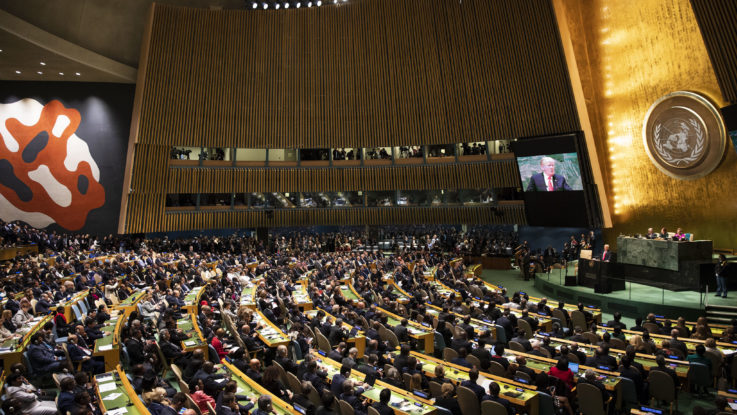
The Trump administration’s selective ‘exit’ from the United Nations has left the door open for Beijing, which is using the opportunity to make international order safer for authoritarianism. As Kristine Lee writes in Foreign Affairs:
Eager to expand its influence on the world stage in ways that serve its interests, China has placed considerable resources behind an effort to present its leadership at the UN as a nimbler, more dynamic alternative to that of the United States. In the past few years alone, the Chinese Communist Party (CCP) has positioned its officials to head up four of the UN’s 15 specialized agencies, while the United States leads only one. It has also advanced more than two dozen memorandums of understanding in support of its Belt and Road Initiative (BRI) and mobilized a consortium of illiberal states to tamp down international criticism of its repression of ethnic Uighurs in Xinjiang Province.
The United States has responded to China’s rising profile in only a piecemeal fashion, in part because Washington has been busy recalibrating its own relationship with the international body. The administration of President Donald Trump has passed through numerous ambassadors to the UN in a short time, while unilaterally withdrawing the United States from certain UN agencies and repudiating multilateral institutions more broadly.
What’s been happening at the United Nations reveals a fundamental weakness of Trump foreign policy.
Trumpism disdains multilateralism as constraining and weakening the United States. The argument isn’t without merit. In contexts where Washington enjoys asymmetric influence with other parties, those parties can strike a harder bargain if they can pool their resources. Bilateralism thus serves as the means to divide other states in order to extract more favorable arrangements.
This helps explain Trumpism’s dislike for the European Union (EU). Some of that hostility is ideological in nature; the EU supposedly advances ‘globalism’ or ‘liberal imperialism.’ Some of it comes down to a much simpler logic. The EU and the US enjoy roughly the same market size and GDP. Obviously, the EU has more leverage with the United States than any of its member-states have on their own—a fundamental reality of international power that no amount of ‘British pluck‘ can compensate for.
One problem with this strategy is that most other leaders understand this as well, and so they’ve often (but not always or consistently) circled the wagons in the face of Trump’s wedge tactics. Others have simply gone ahead on their own with, for example, trade deals or have otherwise ‘routed around‘ the United States.
Another problem is that American retreat from multilateral institutions can make them more, not less, attractive to other great powers. This is particularly true for authoritarian regimes, like those of China and Russia. They are, after all, much more comfortable with multilateralism (or ‘liberal intergovernemntalism’) when its drained of pesky liberal norms about human and political rights.
The conclusion of Exit from Hegemony discusses possible futures of international order. As we argue there:
China and Russia do not support important aspects of American-led international order, and certainly are not fans of U.S. hegemony, but they are keenly aware of the power-political dividends that accrue from generating architectures and controlling infrastructures of order. China and Russia will continue to pursue liberal intergovernmentalism as the US retreats to bilateral transactionalism. If anything, by withdrawing from existing multilateral institutions the Trump administration makes it easier for Russia and China to get their way, thus making intergovernmentalism more, not less, attractive to illiberal states. Thus, rather than rendering international organizations and institutional arrangements irrelevant, Trump foreign policy only accelerates the process of transferring their control and leadership to geopolitical challengers.
Indeed:
The ultimate result might take a form that we could no longer really term “liberal intergovernmentalism,” but would more accurately describe as “authoritarian intergovernmentalism,” with the United States shifted to the periphery of ordering infrastructure. To make matters worse for Washington, the transition to bilateral transactionalism would likely prove quite painful—potentially collapsing relationships and ordering infrastructure the United States would prefer to maintain in a multipolar world.
(This post has been edited since initial publication)

